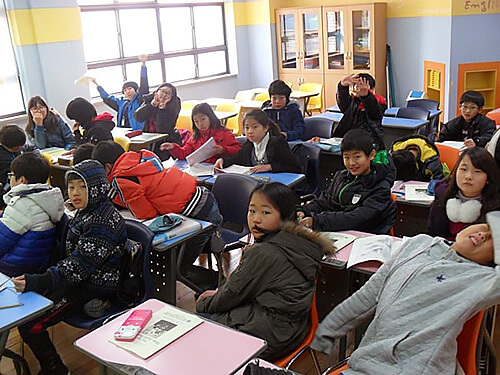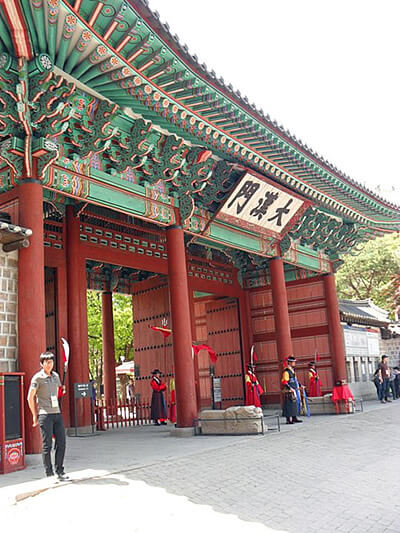Teaching English in South Korea with EPIK
Modern Life Meets Rich Traditions
Article and photos by Michelle Joo Hwang

|
|
Elementary students inside the English classroom.
|
South Korea is a country that boasts of having become highly developed in a very short period. The proof is evident in the shiny lights, tall skyscrapers permeating its various cities, and the Samsung electronics and Hyundai cars sold worldwide. Who would not want to live in a country that is forward and developed but still retains its own culture and heritage for visitors to experience? South Korea is known for its delectable and often wild (think live octopus) foods and intense nightlife (e.g., grabbing drinks with your boss). Nothing is better than to immerse yourself in another culture to truly appreciate how different regions of the world are and to experience new tastes.
With my undergraduate degree almost completed, I was stuck trying to answer the question of what I would do after college. Even after paying for years of schooling, I could not come up with a descriptive answer regarding a plan for my life. Luckily, I came across the EPIK program, which allows those with undergraduate degrees to teach English and live in South Korea. As globalization spreads at an increasing pace, there is a consequent higher demand for the knowledge of English, especially in South Korea.
South Korea has been recruiting English speakers to speak and teach public school students for years. I decided to go with the English Program in Korea (EPIK), a government-funded and reliable program. Teaching English in Korea proved to be the best option in my seemingly (at that time) goal-less life. While experiencing Korean culture firsthand, I was able to learn new teaching skills and think about my future plans even while earning money. Although you must stay at work as in any 9 to 5 job, you are not teaching the whole time. You are teaching no more than 22 hours a week, which means you have 18 additional hours to yourself during the work week. After finishing my teaching hours, I found I had enough time to prepare my next week’s lesson plans and also enough time to study up on the Korean language and the GRE test.
The best part about working in Korea is going on vacation. With your monthly salary, you can afford an incredible vacation to a Southeast Asian country like Thailand or even go to a bustling city like Tokyo. You are given roughly ten days of vacation each summer and winter, and you can go wherever you please. Round-trip tickets to any surrounding country are incredibly cheap, so it is common for native English teachers to travel to at least four or five different countries before finishing their work contract and heading home. Gaining work experience with tropical paradises nearby — can it get much better?

|
|
The Royal Korean Palace in the city of Seoul. |
Work Hard and Play Hard
in South Korea
“Work hard, play hard” seems a motto everyone can relate to in South Korea. During the first week of work, my school hosted a dinner for the entire faculty to eat together. The “first round,” as they call it, started at a barbeque restaurant where we sat in groups and grilled meat together and even drank some beer and soju (a Korean alcoholic drink) together. As bellies were slowly filling, the teachers would walk around with shot glasses and offer a drink to other teachers. Once everyone finished eating, we went to “round two,” which was the noraebang (a karaoke bar). The drinks were plentiful, and even with the hint of pink burning on some cheeks, the drinking continued with some added singing and dancing. These dinners are common; my school had six staff dinners throughout the year! Even after hard work, people are not shy about relaxing and enjoying a drink or two with friends. Surprisingly, many restaurants called Hofs open and serve alcohol 24 hours a day, as well as bars interspersed downtown.
Although Korean nightlife is an experience, there are many other activities. On a subway during the weekend, you will often see older men and women dressed in hiking gear. Hiking mountains is a widespread pastime for Koreans. Not only is hiking good for your health, but it is also an excellent way to experience Korean culture since many mountains are home to Buddhist shrines and other Korean artifacts.
The EPIK Application Process
Becoming an English teacher through EPIK is a 3-part process. Part one involves filling out the application form and getting two letters of recommendation. With the large number of applicants for this program, EPIK has now made it mandatory for applicants to create a sample lesson plan that outlines how the prospective native English teacher will conduct a lesson. Once you send in the application form and the recommendation letters, an EPIK recruiter will contact you via email for an interview. The interview is part two of the process. They will ask questions related to your application and about the job. Once you have completed the interview process, they will contact you to let you know whether you have made it or not. After a successful interview comes the longest part of the process: gathering your documents from home to send them over. EPIK works on a first-come, first-serve basis, so the faster you send in your papers, the greater your chances of securing a spot. You must request that some forms have an apostille attached and a seal certifying that the document is an authentic original copy.
The required documents include:
-
Completed application form
-
Copy of bachelor’s diploma with apostille attached
-
Original sealed transcript
-
National level Criminal Record Check with apostille attached
-
Two recommendation letters from academic/professional sources
-
Copy of passport photo page
See the EPIK Program Facebook page for much more information.
Application Advice
The first thing you should do even before your interview is to start collecting as many of the documents as you can. The National Criminal Record Check (FBI check) for Americans is time-consuming, so it is best to request this as soon as possible. Getting an apostille for a document is also time-consuming because you have to get the document signed by a notary public and then stamped by the secretary of state. There are various ways to do this: you can hire someone for up to 150 dollars to get your document an apostille, or you can research online and do it yourself much more cheaply.
With such a significant surge of people trying to get into the English teaching field, some people are still looking for a job. Being cut from a program is not the end of the world! A handful of programs help native English speakers get teaching jobs in Korea. There is a program called GEPIK that also provides jobs teaching English. GEPIK is also a government-funded program that only hires teachers for the Gyeonggi-do region. There are also “hagwons” English speakers can apply to, which are after-school academy programs where local students go to get tutored and try to learn more and gain advantage outside of public school. It is best to try and find one of these jobs using a recruiter or websites to see where and to whom to send your resume. Be sure to do your research regarding hagwons, asking for references, as a few are on notorious "blacklists."
The following are helpful websites that have job listings and recommendations for teaching positions in Korea:
Another option is to find a recruiting company and have a recruiter walk you through all the steps required to obtain a job. These recruiting companies help you find a job in the EPIK or GEPIK programs or even at a “hagwon.” The best part about having a recruiter is that their service is free for the applicant.
The following are well-known recruiting companies for jobs teaching English in South Korea:

|
|
Elementary girls choosing English names for English camp.
|
Benefits of the EPIK Program
Almost all jobs in Korea provide the same type of benefits for a native speaker who signs a 1-year contract (Note: 2,100,000 Korean won = US$1,550 as of 5/2024). You may find the EPIK payscale where you may
find the many enticing benefits
.
What to Expect
in the Teaching Programs
Before departing for Korea, organizing your life back home as much as possible is best. You will work for an entire year, and your life will be much easier to manage if you do not leave any loose ends behind. Being a foreigner with a language barrier will make tasks that might be simple at home not quite so simple in Korea. While most co-workers have a basic knowledge of English, things can still get lost in translation.
Foreigners from certain countries are exempt from paying taxes in Korea. Suppose you provide your employer with a Residency Certificate. In that case, they do not deduct South Korean taxes from your pay. It would be best to get the Residency Certificate while you are still at home because if you try to get it while working, it takes a long time to send the form to request the certificate and to receive it.
Your placement depends upon the program that you apply to. If you desire to work in a metropolitan city, you may still be placed in a rural province due to bad luck. For example, the EPIK program emphasizes placing applicants in three key cities such as Seoul, Busan, and Daegu, but may instead try offering you the right to select your teaching destination. If the spots for Seoul or Metropolitan City are all filled by the time you turn in all your documents, you will likely be placed in a Provincial province. With the GEPIK program, placements are in the suburbs of Seoul, the
Gyeonggi province.
With GEPIK, the schools have discretion over which native English teacher they would like to hire, whereas with EPIK, the schools have no choice.
Respecting Korean Culture and Customs
Korea, as with any other country, has its own rules and customs that people must abide by to respect the culture. Somehow, many people who come to Korea lose sight of the need to respect the host culture. Old age commands more respect in Korea, and work schedules are sometimes unnecessary. Things change on short notice, and sometimes, events are unexpected; local people might ask you to do things on short notice. Some find this hard to adapt to, but others find a way to manage and learn from the experience. You must remember that you are a guest in a country that does not necessarily share the same notions about the type of “common courtesy” compared to where you come from. Therefore, you should adapt to them respectfully. Such cultural adaptation is a small price to pay for an experience you will never forget.
Born and raised in Southern California, Michelle is a twenty-three-year-old Korean-American who wanted to fully experience Korean culture by moving to South Korea. Her home in America is in Hacienda Heights, California, but she still works in South Korea. She majored in economics and minored in education at UCI and is still considering her options. Teaching in Korea was her first job since college. It is a beneficial learning experience, so she let others know about it!
|
